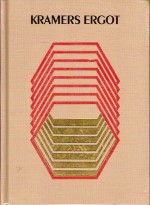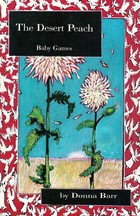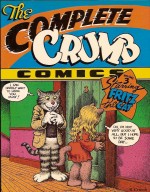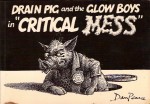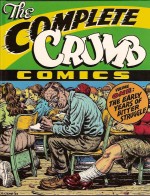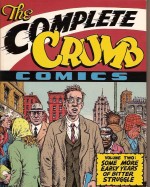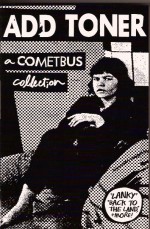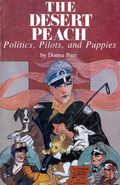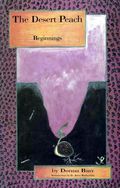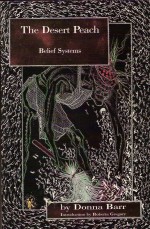
By Donna Barr (Aeon)
ISBN: 1-883847-07-9
The Desert Peach is the supremely self-assured and eminently capable gay brother of the legendary German soldier hailed as “the Desert Fox†and one of the most perfectly realised characters in comics.
Set in World War II Africa and effortlessly combining hilarity, absurdity, profound sensitivity and glittering spontaneity, the stories describe the daily grind of Oberst Manfred Pfirsich Marie Rommel; a dutiful if unwilling cog in the German War Machine and his efforts to remain a civilised gentleman under the most adverse and unkind conditions.
However, although as formidable as his beloved elder sibling Field Marshal Erwin Rommel, the gracious and genteel Peach is a man who loathes causing harm or giving offence and thus spends his dry and dusty days with the ever-so-motley crew of the 469th Halftrack, Gravedigging & Support Unit of the Afrika Korps, trying to remain stylish, elegant, civil and gracious to the men under his command and the enemy forces around him.
It’s a lot of work: the 469th houses the worst dregs of the Wehrmacht, from malingerers and malcontents to useless wounded, sharpers, screw-ups and outright maniacs.
Pfirsich unilaterally applies the same decorous courtesies to the sundry natives inhabiting the area and the rather tiresome British – not all of whom are party to a clandestine non-aggression pact Pfirsich has agreed with his opposite numbers in the amassed Allied Forces. The only people the Peach really has no time for are boors, bigots, bullies and card-carrying Blackshirts…
The romantic fool is also passionately in love with and engaged to Rosen Kavalier: handsome Aryan warrior and wildly manly Luftwaffe Ace…
Arguably the real star of these fabulous frothy epics is the Peach’s long-suffering, unkempt, crafty, ill-mannered, bilious and lazily scrofulous orderly Udo Schmidt, a man of many secrets whose one redeeming virtue is his uncompromising loyalty and devotion to the only decent man and tolerable officer in the entire German army.
This tragically rare fifth softcover collection reprints issues #13-15 and starts with an enchanting comic introduction from the captivatingly clever Roberta Gregory after which the sagacious star yields focus to the tragically bewildered Doberman in ‘Nobody’ wherein the pitifully shell-shocked Corporal finally blows himself up with his pet landmine and is evacuated home.
Dobi unexpectedly returns some time later with tales of his nightmarish detour to the hidden Jewish concentration camps where all the undesirables are being dealt with: systematically and efficiently eradicating Jews and other “sub-humans 
Pfirsich is appalled and refuses to believe the stories: surely no sane human beings could perpetrate such atrocities? Udo however, has also heard stories of how Hitler and his hierarchy are dealing with Jews and shares them with his commander. In a rage the Peach rushes off to tell his brother, knowing the Field Marshal can do something about it.
The noble Desert Fox also explodes in fury and determines to return to Berlin to stop the program. His plan is simple – since Hitler is a good man and cannot possibly know of these atrocities, all Erwin has to do is inform Adolf and the Fuhrer will put a stop to the horrors…
Pfirsich, knowing Hitler’s hierarchy far better than that, is faced with an impossible choice: allow his brother to sign his own death warrant or withdraw the allegations and become complicit in genocide…
This bleakly chilling and tortured black comedy is followed by ‘Surprise, Surprise’ with Udo griping and trying to weasel his way out of his impending, unwanted but necessarily pragmatic wedding to Bedouin princess Falila. The swarthy little scoundrel wants sex not commitment, but as Pfirsich urges his subordinate to honour his word and live up to his responsibilities another secret slips out.
Udo Schmidt used to have another name: the only card-carry Nazi Party member in the entire 469th was born Isador Gülphstein…
“Udo†is the scion of a venerable line of soldiers who have served the Fatherland and the long-suffering son of a proud German Jewish veteran of the Great War who changed the family name so that his sons could join the army too… whether they wanted to or not.
Now, with The Peach fully aware of the fate Jews are facing, how can he risk Schmidt’s secret getting out? Moreover how can he risk antagonising the desert tribes or disappointing the clearly addled girl who wants to marry Udo? After all, fanatic camp political officer Kjars Winzig already suspects something isn’t – or rather is – Kosher about Udo…
The troubles only really begin when eavesdropping boyfriend Rosen Kavalier takes charge and offers a drastic and outrageous solution…
This darker-than-usual volume concludes with ‘The Triangle Trade’ (from a suggestion by cartoonist Steve Gallacci) as The Peach encounters by-the-book soldier Oberst Quark, herding a supply column directly towards an Allied tank unit.
Keen to avoid any bloodshed Pfirsich intercepts the column and lends the commander his spotter plane, determined to keep the Germans out of trouble whilst their war-mongering commander is safely up in the air.
Deprived of glorious battle Quark conceives a subtle vengeance and transfers the two biggest troublemakers in his command to the 469th.
Sadly the younger Rommel has never encountered the average fighting man and sorely overestimates his ability to control the greedy, vicious and cunningly duplicitous thugs Leutnants Hecht and Horowitz…
With the camp quickly dissolving into a hotbed of criminality and black marketeering harsh measures are called and this time even Rosen has met his match. Seizing the nettle Pfirsich is forced to fall back upon his own unique strengths to solve this thorny dilemma effectively and with unmistakable style…
Fabulously following the same anti-war path as Sgt. Bilko, Hogan’s Heroes, Oh, What a Lovely War! and Catch 22, as well as such tangential films as Priscilla, Queen of the Desert and The Birdcage, these Desert Peach adventures are always bawdy, raucous, clever, authentically madcap and immensely engaging.
These gloriously baroque yarns were some of the very best comics of the 1990s and still pack the comedic kick of a silken howitzer or chartreuse flamethrower, liberally leavened with situational jocularity, accent humour and lots of footnoted Deutsche cuss-words for the kids to learn. Moreover, with this volume the dark bitter edges and cold iron underlying these fabulous characters and their horrific, doomed situation become ever more poignant and powerful.
The Desert Peach ran for 32 intermittent issues via a number of publishers and was subsequently collected as eight graphic novel collections (1988-2005). A prose novel, Bread and Swans, a musical and an invitational collection by other artists entitled Ersatz Peach were also created during the strip’s heyday. A larger compendium, Seven Peaches, collected issues #1-7 and Pfirsich’s further exploits continue as part of the Modern Tales webcomics collective…
Illustrated in Barr’s fluidly seductive wood-cut and loose-line style, this book is a must-have for any lover of wit, slapstick, high drama and belly-laughs and grown-up comics in general. All the collections are pretty hard to find these days but if you have a Kindle, Robot Comics have started releasing individual comicbook issues for anybody with internet access and mature tastes…
© 1991-1994 Donna Barr. Introduction © 1994 Roberta Gregory. All rights reserved. The Desert Peach is ™ Donna Barr.

